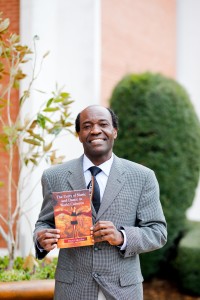 “The world of music is rich with artifacts that make me want to know the correlations of these artifacts and the human sociocultural milieu,” said associate professor of music Dr. David Akombo in his new book, “The Unity of Music and Dance in World Cultures.”
“The world of music is rich with artifacts that make me want to know the correlations of these artifacts and the human sociocultural milieu,” said associate professor of music Dr. David Akombo in his new book, “The Unity of Music and Dance in World Cultures.”
From a global perspective, music and dance are examined in various countries in Africa, the Americas, Asia, Europe, the Middle East and the South Pacific in order to study the relationship between them and the human sociocultural environment.
Akombo also touches on spirituality and repression within different cultures, such as the Yoruba people of Nigeria, who utilize drums for prayer, and the Afro-Brazilians, who were denied their cultural heritage of the capoeira dance. “It is believed that the true origin of music and dance are based on the divine power. Various nations of the world support this theory through their myths,” he said.
While many scholars have viewed music and dance as one body, others have been intrigued by cultures that prove that can also be independent. In examining the cultural use of sound and body movement, the book also investigates this cultural phenomena by presenting music and dance as two separate units and then as one entity working together.
Although this book is not meant to remove the usual meanings of world cultures that have unified music and dance for everyday use, Akombo said it still “provides an insight into the study to find the pre-historical and anthropological misconceptions on their unitary existence.”
Akombo is the interim chair of the Department of Music in the College of Liberal Arts at Jackson State University.







